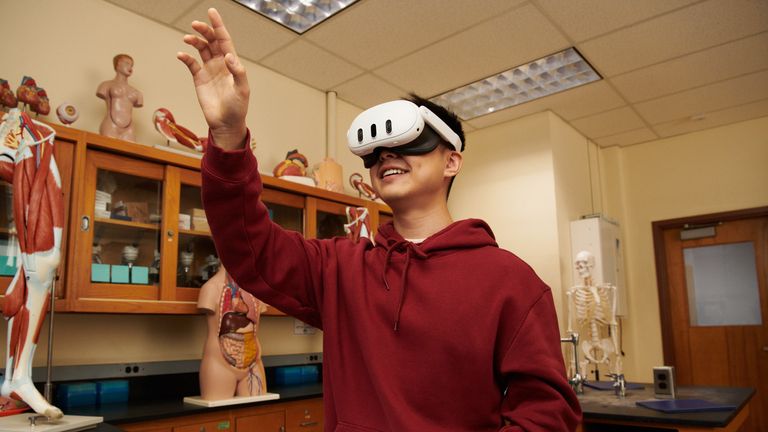Virtual reality headsets will not be used in schools under a new Meta scheme unless teachers can monitor what pupils are doing, Sir Nick Clegg has said amid growing concerns about child safety in the metaverse.
Mr Clegg said: “This is not going to be used in the classroom unless teachers feel they have complete visibility and control of what’s going on.
“And crucially, that parents, particularly of the younger kids, feel that too, otherwise, why would you use this in an educational setting?”
Meta has announced a new package for schools to use virtual and augmented reality as a learning tool by allowing teachers to scale how they use VR headsets for multiple users at once in the classroom.
Pupils aged 13 and over will be able to enter the metaverse in their classrooms for immersive lessons that allow them to visit museums, practise speaking different languages, or enter 3D versions of environments they otherwise could not access.
The company has also introduced a feature called “shared mode” in which children will not be able to access the Meta Quest store to download new apps or games and other users will not know the identity of the school user, Mr Clegg said.
He added: “It’ll be a much more engaged, participatory, and immersive experience than is currently the case in the classroom and an entirely safe one for that reason because the teachers will be fully in control.”
The metaverse is an umbrella term for 3D immersive virtual worlds in which people can interact with each other and create a shared space that many users access with a headset.
There are several metaverse platforms including Fortnite, Roblox and Meta’s Horizon Worlds.
The total number of monthly active users across the metaverse platforms reached 600 million by the end of 2023, according to figures published by Metaversed, the metaverse consultancy.
The vast majority of metaverse users are children. Around 84% of users are under 18 and 51% of total users are 13 or younger.
Rani Govender, senior child safety online policy officer at the NSPCC children’s charity, said: “Young people should be protected in the online world wherever they access it, and their safety and wellbeing should be at the forefront of Meta’s decisions if they are to expand the use of these products for children.
“Children continue to face unacceptable harm in the metaverse and protections must be rolled out across the board so young people who may potentially enjoy safer experiences in schools are not then put at risk when using Meta’s products at home.”
Mr Clegg acknowledged that cost will be a barrier for some schools.
He said: “Every time you have new technology, whether it’s a calculator or a whiteboard, that becomes mainstream education over time, you’ve always got an early adopter issue, which is that the technology tends to be more expensive at the beginning than it is at the end as volume ramps up.
“Therefore it’s easier for schools and colleges with more means to use the technology earliest. All we can do is try and make the technology as affordable as we can.”
The education product is expected to be launched by Meta later this year.



























